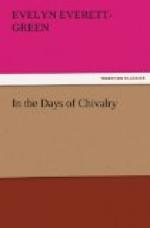John showed no disposition to enter the Church — probably the hope of winning his spurs was not yet dead within him; but he took very kindly to book lore, and had often shown a shrewdness and aptness in diplomatic negotiation which had made Master Bernard prophesy great things for him.
Raymond had never heard such matters discussed before, and knew little enough about the art of government. He looked with respect at his companion, and John, catching the glance, smiled pleasantly in reply.
“I trow thou wouldest sooner be with the rest, hearing of the King’s Round Table and the knightly jousts to follow. Let me not weary thee with my graver words. Go join the others an thou wilt.”
“Nay, I will stay with thee,” answered Raymond, who was greatly attracted by John’s pale and thoughtful face, and could not but pity him for his manifest lack of strength and muscle. The youth was tall and rode well, but he was slight to the verge of attenuation, and the hollow cheek and unnaturally bright eyes sunk in deep caverns told a tale that was not hard to read. Young De Brocas might make a student, a clerk, a man of letters, but he would never be a soldier; and that in itself appeared to Raymond the greatest deprivation that could befall a man. But he liked his companion none the less for this sense of pity.
“I would fain hear more of England — England’s laws, England’s ways. I have heard that in this land men may obtain justice better than in any other. I have heard that justice is here administered to poor as well as rich. I would learn more of this. I would learn more of you. Tell me first of yourself. I know well the name of De Brocas. We come from the very place where once you held sway. The village (as you would call it) of Brocas was not so very far away. Tell me of yourself, your father, your uncle. I know all their names right well. I would hear all that you can tell.”




